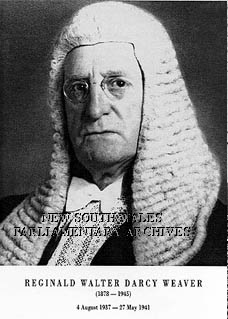
Date of Birth: 18/07/1876
Place of Birth: 'Kickerbil' Station, Liverpool Plains, New South Wales, Australia
Date of Death: 12/11/1945
Place of Death: Hornsby, New South Wales, Australia
Parliamentary Service
| Member for Neutral Bay |
27 May 1944 |
12 Nov 1945 |
1 year 5 months 17 days |
|
| Member for Neutral Bay |
10 May 1941 |
24 Apr 1944 |
2 years 11 months 15 days |
|
| Member for Neutral Bay |
04 Mar 1938 |
18 Apr 1941 |
3 years 1 month 15 days |
|
| Speaker of the Legislative Assembly |
04 Aug 1937 |
27 May 1941 |
3 years 9 months 24 days |
|
| Member for Neutral Bay |
11 May 1935 |
24 Feb 1938 |
2 years 9 months 14 days |
|
| Member for Neutral Bay |
11 Jun 1932 |
12 Apr 1935 |
2 years 10 months 2 days |
|
| Secretary for Public Works and Minister for Health |
16 May 1932 |
10 Feb 1935 |
2 years 8 months 26 days |
|
| Member for Neutral Bay |
25 Oct 1930 |
18 May 1932 |
1 year 6 months 24 days |
|
| Secretary for Mines and Minister for Forests |
16 Apr 1929 |
03 Nov 1930 |
1 year 6 months 19 days |
|
| Member for Neutral Bay |
08 Oct 1927 |
18 Sep 1930 |
2 years 11 months 11 days |
|
| Member for North Shore |
25 Mar 1922 |
18 Apr 1925 |
3 years 25 days |
|
| Member for North Shore |
20 Mar 1920 |
17 Feb 1922 |
1 year 10 months 29 days |
|
| The Governor's Opening Speech Committee No.1 |
17 Jul 1917 |
30 Mar 1918 |
8 months 14 days |
|
| Member for Willoughby |
24 Mar 1917 |
18 Feb 1920 |
2 years 10 months 26 days |
|
| Member of the NSW Legislative Assembly |
24 Mar 1917 |
12 Nov 1945 |
28 years 7 months 20 days |
|
Political Party Activity
Nationalist Party; councillor 1925-1926, vice president 1929-1932. United Australia Party; councillor 1932-1938. Democratic Party 1944; leader. Involved in negotiations for the formation of the Liberal Party. Liberal Party; leader 20 April 1945 - 12 November 1945.
Qualifications, occupations and interests
Stock and real estate agent. Educated at Newington College; joined brothers in stock and land business at Forbes 1895-1896; subsequently in business on own account at Condobolin and Narrandera, and at Dubbo c.1911-1916; established an estate agency in Sydney in 1916; member of Farmers and Settlers' Association; director of Royal Prince Alfred Hospital 1929-1930; Protestant Federation 1921; supported New Guard; Christian Scientist.
Membership of other Parliaments & Offices Held
Local Government Activity
Alderman at Condobolin 1898-1900 and Narrandera 1902.
Personal
Son of Richard Weaver, grazier, and Fanny Weaver, English migrants. Married Gertrude Susan Bond in c.1899 and had issue, 3 daughters and 1 son. Funeral at Northern Suburbs crematorium.
Additional Information
Australian Dictionary of Biography, Volume 12
Text from the book: 'The Presiding Officers of the Parliament of New South
Wales', Sydney, 1995
Reginald Weaver was born in 1876 at Kickerbil Station on the Liverpool Plains.
He married Gertrude Walker in 1899 and they had one son and three daughters. He
worked with his brothers in a stock and land business in Forbes before
establishing a Sydney based real estate agency in 1916. He had several years
experience in local government as an alderman on the Condobolin Council between
1898 and 1900 and the Narrandera Council in 1902. A member of the United
Australia Party, he was also a supporter of the New Guard. Weaver became
heavily involved in negotiations involving the formation of the Liberal Party,
of which he became State leader between 1944 and 1945.
Unsuccessfully contesting the seats of Ashburnham in 1910 and Macquarie in
1913, he was elected to the Legislative Assembly as the Member for Willoughby
between 1917 and 1920, for the North Shore from 1920 until 1925 and for Neutral
Bay between 1927 until his death in 1945. Weaver had several Ministerial
responsibilities including the Mines and Forests portfolio from 1929 until 1930
and the Public Works and Health portfolio from 1932 until he was dropped from
the Ministry in 1935. He was elected Speaker of the Legislative Assembly
between 1937 holding this office until 1941. As Speaker of the Legislative
Assembly during World War II, Weaver held the view that national interest
should outweigh political aspirations and allegiances. Consequently, he was
able to maintain good order in the House by encouraging the House to abandon
sectarianism in favour of unity in the face of national crisis. Weaver
developed a reputation as an eloquent, hard hitting debater who took personal
criticism well. After suffering a mild heart attack in the Legislative Assembly
chamber on the evening of November 7, he drove himself home and died a week
later on 12 November 1945 at Hornsby.
